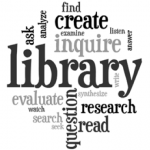 Welcome to a new academic year! HSLS offers a wide array of research and information services, educational opportunities, and resources to support the health sciences.
Welcome to a new academic year! HSLS offers a wide array of research and information services, educational opportunities, and resources to support the health sciences.
Liaison Librarians are integrated into schools and departments and collaborate with faculty to support instruction, research, and scholarship. They provide instruction as part of the curriculum, guest lectures, and customized orientation sessions; offer recommendations for embedding streaming media and other HSLS resources into course syllabi; collaborate on research projects; provide assistance with researching health and biomedical topics; and offer guidance with scholarly publishing. All new and returning faculty are encouraged to arrange a consultation with your liaison librarian to learn how HSLS can support your teaching and research.
Data Services Librarians offer consultation and customized training to help you organize and describe your research data, write data management plans, create data visualizations, identify appropriate data repositories, cite datasets accurately, comply with data sharing policies, and preserve your data for long-term access. The Pitt Data Catalog is managed by HSLS Data Services and serves as a tool to help researchers identify and locate datasets created by University of Pittsburgh faculty. Consider increasing your visibility by including your dataset in the Pitt Data Catalog.
HSLS Molecular Biology Information Service offers access to licensed software to support next-gen sequencing, gene regulation, pathway analysis, microarrays, and genetic variation data analysis. Bioinformatics specialists provide regular workshops and individualized consultation.
Our in-house classes, workshops, and events are open to the entire University community. This semester, we are offering several new sessions such as:
- Are You Using Retracted Information?
- Beyond Beginner Workshop: Getting Going with Pandas in Python
- From Protocol to Publication: Selecting the Right Reporting Guideline for Your Paper, Study, or Article
- Hands-on Git
- Managing Data for Comprehensive Lit Reviews: DistillerSR
- Responsibly Reusing Data
- Version Control
- Writing Good READMEs
- And more!
You can view our entire suite of classes, covering topics on publishing, literature searching, citation management, data science, instructional and visual design, and molecular biology. Classes may be tailored and requested for your class, department, or group.
Finally, Virtual Reality (VR) equipment and software programs are available in the library. These include 3D Organon VR Anatomy, a virtual reality anatomy atlas that lets you explore bones, muscles, and organs, and MedicalHolodeck which allows you to view files from MRI- and CT-scans in 3D virtual reality. The Technology Help Desk can help integrate VR into your curriculum.
~Renae Barger